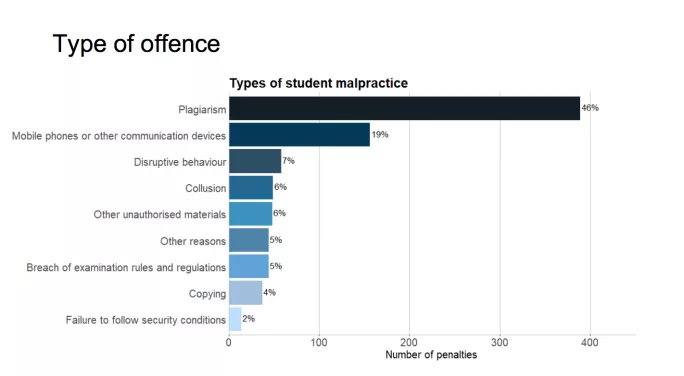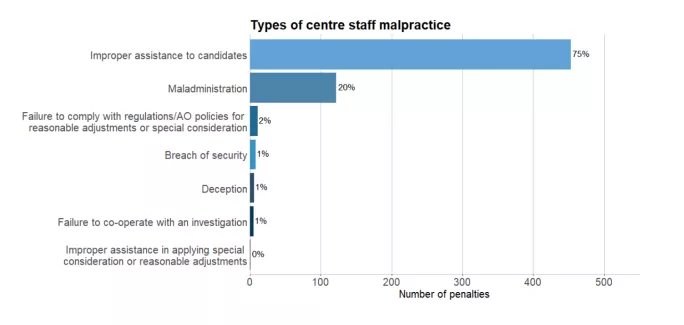More than 840 penalties were issued to students for cheating in vocational and technical qualifications during the 2017-18 academic year, Ofqual has revealed.
A report published today reveals the scale of malpractice across all vocational and technical qualifications - showing that of the 1,539 penalties given in 2017-18, the greatest number went to students (55 per cent), followed by centre staff (39 per cent) and then centres (6 per cent).
The qualifications covered by the report include technical awards, applied generals, technical certificates and technical levels. Also included were Pre-U and international baccalaureate (IB) qualifications.
News: ESFA looking for providers for 19-24 traineeships
More: Will exam malpractice commission focus on complexity?
Background: Malpractice report calls for all watches to be banned
Malpractice undermined the integrity of assessments, Ofqual said, adding: “Malpractice is a serious threat to the safe delivery and trust in qualifications, as it undermines the integrity of assessments. It includes attempts by students to plagiarise, and attempts by school or college staff to give too much support (ie, improper assistance). Ofqual requires awarding organisations to have procedures in place to prevent, investigate and act in relation to malpractice incidences.”
Plagiarism, use of mobile phones and collusion
Almost half (46 per cent) of instances of malpractice by students involved plagiarism, and one fifth (19 per cent) related to the use of mobile phones. Students were also penalised for disruptive behaviour (7 per cent), collusion (6 per cent) and failure to follow security conditions (2 per cent).
The data also found that malpractice was more likely to occur in performance tasks (68 per cent), for example, a presentation or performance. Almost 20 per cent of penalties occurred in paper-based exams, and 13 per cent in online exams.
When it came to centres and centre staff, the most common form of malpractice was “improper assistance to candidates”: 50 per cent and 75 per cent respectively.
Students were most commonly penalised with a loss of marks (44 per cent), followed by a warning (39 per cent). In 17 per cent of cases, penalty included loss of aggregation or certification.
Centre staff were likely to either get a written warning (45 per cent) or further training (41 per cent). Around 7 per cent of staff were disbarred or suspended.
Half of centres got a “review and report” penalty, while a third were given a written warning. Just over 10 per cent of centres were subject to additional monitoring or inspection, 4 per cent had to suspend candidate registrations or entries, and at 3 per cent of centres, recognition was withdrawn.
In the majority of cases, malpractices across students, centres and staff resulted in one penalty. The data shows that multiple penalties were more common for centre staff, with fewer than 5 cases resulting in 12 penalties per staff member spread across different cases.
An Ofqual spokesperson said: “To ensure the integrity of assessments it is vital that matters of malpractice are closely monitored and appropriately acted on. Whilst awarding organisations are required to have procedures in place to prevent, investigate and act in relation to incidents of malpractice, it is important that Ofqual continues to have a good understanding of the scale and nature of malpractice. The data released today will ensure equal visibility is given to malpractice within vocational and technical qualifications.”






